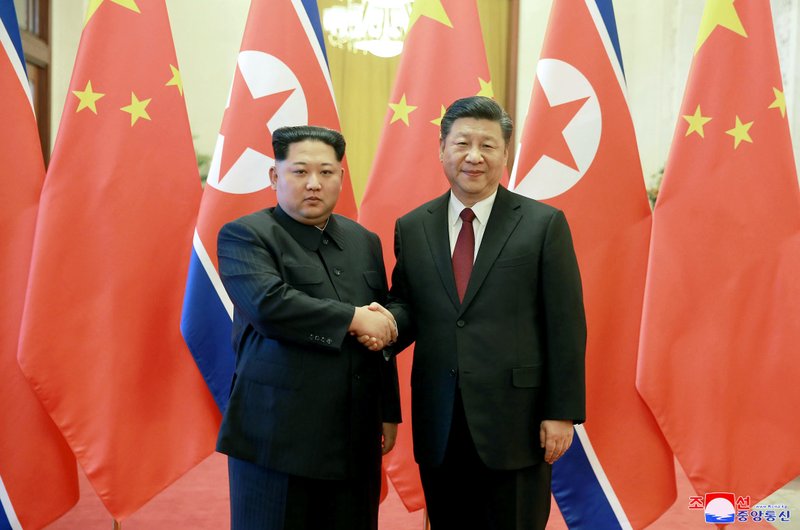TOKYO (AP) — As the U.S.-North Korea summit looms, President Donald Trump’s maximum pressure policy on North Korea may be working — thanks to China.
Beijing appears to have gone well beyond U.N. sanctions on its unruly neighbor, reducing its total imports from North Korea in the first two months this year by 78.5 and 86.1 percent in value — a decline that began in late 2017, according to the latest trade data from China. Its exports to the North also dropped by 33 percent to 34 percent both months.
The figures suggest that instead of being sidelined while North Korean leader Kim Jong Un made his surprising diplomatic overtures to Seoul and Washington, China’s sustained game of hardball on trade with Pyongyang going back at least five months may have been the decisive factor in forcing Kim’s hand.
Trade with China is absolutely crucial to North Korea’s survival.
It accounts for the largest share of the North’s dealings with the outside world and provides a lifeline to many of the necessities Pyongyang relies on to keep its nation fed and its economy from breaking down. Estimates vary, but it is believed that roughly half of all transactions in the North Korean economy are made in foreign currencies, with the Chinese yuan being the most common.
That gives Beijing tremendous leverage, though for political and national security reasons it has generally been reluctant to exert too much pressure on Pyongyang.
That reluctance is clearly wearing thin.
The statistics need to be taken with a dose of caution. Neither country is known for its commitment to transparency. Even so, more specific data reveal an even tougher, targeted crackdown, according to Alex Wolf, a senior emerging markets economist with Aberdeen Standard Investments:
— China’s exports of refined petroleum have collapsed over the past five months — to an annual rate of less than 4 percent of what it exported last year. With the pace on a downward trend, he believes, total exports could actually fall further.
— North Korean steel imports from China have also collapsed in 2018, and the same goes for cars. Wolf notes that it’s unclear if China is blocking such exports or North Korea simply can’t afford them. But either one, he wrote in a recent report for the company, would be a clear signal the North’s economy is “under a great deal of stress.”
“While China’s role over the past few months has often been overlooked or little understood, it appears a strategy could be emerging: China wants to play a central role in ‘resolving’ this crisis, but wants to do it on its own terms,” he wrote. “It’s increasingly clear that Chinese pressure is a driving force and China will play a central role in any future talks.”
Kim announced in his New Year’s address he would reach out to the South to ease tensions on the Korean Peninsula. He then agreed to hold a summit with South Korean President Moon Jae-in on April 27 and with Trump after that. But to the surprise of many, Kim suddenly showed up in Beijing first for a summit with President Xi Jinping last month, underscoring the continued primacy of China in North Korea’s foreign relationships.
Lu Chao, director of the Border Study Institute at the Liaoning Academy of Social Sciences, noted that China accounts for almost 80 percent of the North’s total trade, meaning the onus for implementing U.N. sanctions has been mainly borne by Beijing, whose enforcement has created “huge pressure on North Korea.”
“There is no doubt China is doing more than ever when it comes to sanctions,” he said, adding restrictions on sales of textile and seafood products to North Korea imposed by China last autumn “have dealt a huge blow to the country.”
“China has played a very important role in promoting the current change of the situation,” he said.
The decrease in trade isn’t just about politics.
China’s economy is also dealing with overproduction in many industries and its demand for North Korean imports is low. Efforts at joint development projects have languished and difficulties suffered by Chinese firms in North Korea — especially problems receiving payment — have soured enthusiasm for cross-border trade.
But the deficit presents an obvious dilemma for the Kim regime: the more it depletes its foreign reserves by buying in excess of what it sells, the less money it has to buy anything at all. Normally, that would lead to inflation — and even hyperinflation — as imported necessities become scarcer and people who can afford to do so dump their holdings in the local currency to buy safer U.S. dollars or Chinese yuan.
Georgetown University economist William Brown said he believes the North’s current account deficit has risen dramatically since the strengthening last November of sanctions on North Korean exports by China, which he said are by now “certainly biting.”
“Why is Kim venturing his offer now? My impression is he is feeling very strong pressure from China’s virtual embargo on North Korea’s exports, and what he must see as a gradual ratcheting down of needed imports, even petroleum,” Brown wrote in a recent blog post. “This is an enormous economic hit of a sort the country has never had to deal with on this scale.”
Brown believes an important indicator of the North’s economic health will be movement of the unofficial but widely used exchange rate for the North Korean currency, which has been surprisingly stable at around 8,000 to the U.S. dollar for years but should now be under intense inflationary pressure.
“China is giving us the chance, and (we should) use it cleverly to get what we want out of the nuclear program and systemic reform,” he added. “It’s not so impossible if you realize everyone, even young Kim, can benefit.”
___
Associated Press researcher Yu Bing in Beijing contributed to this report. Talmadge is the AP’s Pyongyang bureau chief. Follow him on Twitter and Instagram: @EricTalmadge.
AP

